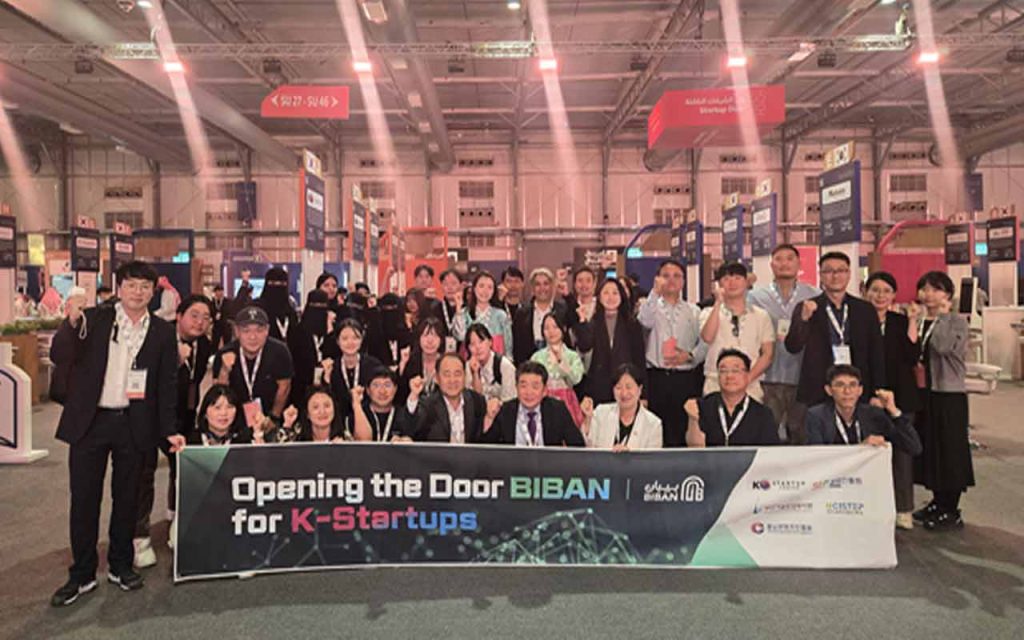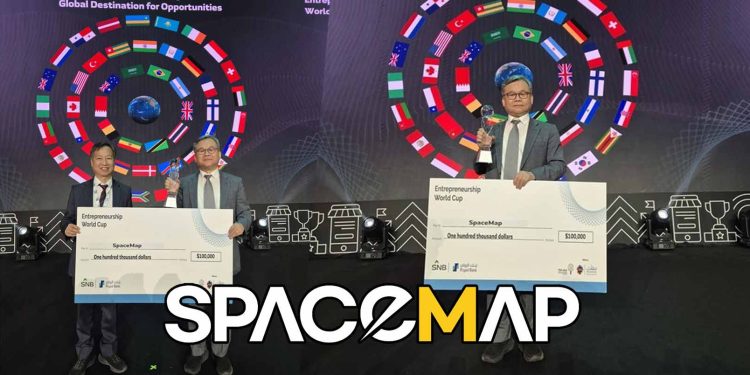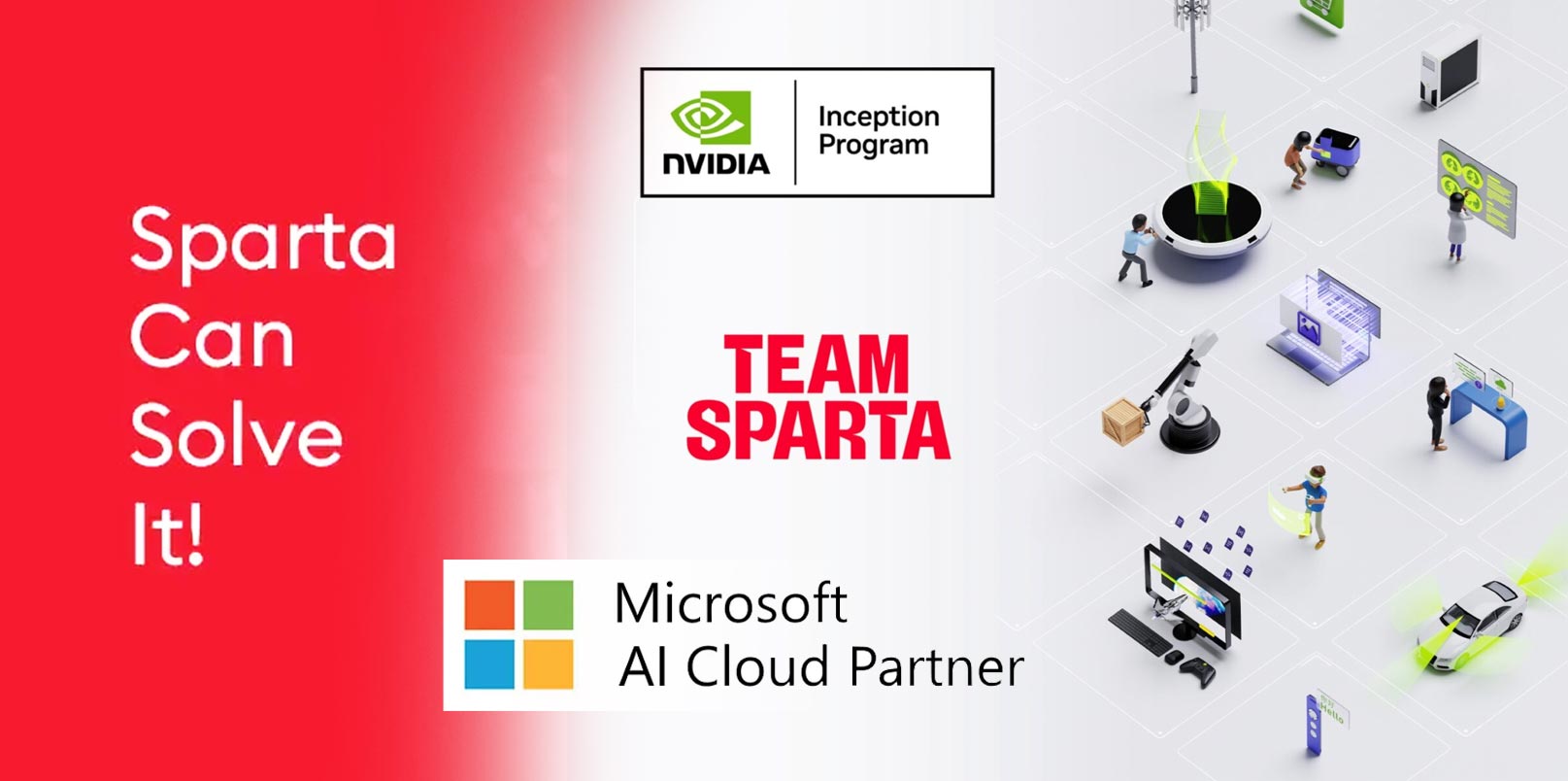Korea’s deep-tech ecosystem is gaining international traction as Spacemap, a Seoul-based startup, claimed the global championship at the Entrepreneurship World Cup (EWC) 2025, held during BIBAN 2025 in Saudi Arabia. The victory highlights Korea’s accelerating role in cross-border innovation and the government’s growing push to position Korean startups at the forefront of the global deep-tech race.
Korean Startup Spacemap Wins World Title at Middle East’s Largest Startup Festival
Spacemap triumphed at the EWC 2025 global finals, hosted by Saudi Arabia’s Small and Medium Enterprises General Authority (Monsha’at) in partnership with the Global Entrepreneurship Network (GEN). The event took place November 5–8 in Riyadh during BIBAN 2025, the Middle East’s largest startup and entrepreneurship exhibition.
Spacemap’s winning innovation, a spatiotemporal AI technology for space domain awareness, impressed global judges for its precision, security, and potential applications in both commercial and defense sectors. The technology reflects a broader surge in Korea’s frontier-tech capabilities, particularly in AI, aerospace, and dual-use innovation.
Among the TOP 100 finalists, eight Korean startups reached the global stage — an unprecedented level of representation that underscores Korea’s strategic investment in global entrepreneurship networks.
Further Expanding the K-Startup Presence in the Middle East Through BIBAN 2025
The Korea Institute of Startup and Entrepreneurship Development (KISED) led the country’s presence at BIBAN 2025 through a K-Startup Pavilion, established jointly with the Korea SMEs and Startups Agency (KOSME), Busan Technopark Startup Investment Foundation, the Cheonan Science and Industry Promotion Agency, and the Chungnam Content Agency.
A total of 31 promising Korean startups were selected for participation, engaging in business meetings, product demonstrations, pitching sessions, and networking programs.
The delegation reported 717 business consultations and 33 on-site memoranda of understanding (MOUs) by November 18, signaling tangible traction for Korean ventures in the Middle East market.
Additionally, as part of the K-Startup Pavilion delegations, 20 startups from Cheonan City successfully signed USD 255 Million investment agreements, reflecting growing investor confidence in the technological and commercial readiness of Korean startups beyond the metropolitan regions.
The pavilion also provided exposure to high-level investors, policymakers, and ecosystem enablers across 150 participating countries, aligning with Korea’s broader strategy to connect its startups with new growth markets in the Middle East.

Spacemap Winning EWC 2025 at BIBAN: “A Turning Point for Korean Startups”
Yoo Jong-pil, President of the Korea Institute of Startup and Entrepreneurship Development (KISED), described BIBAN 2025 as a pivotal platform for Korea’s startup globalization.
“BIBAN 2025 proved that K-Startups can compete and win in one of the world’s most dynamic markets. Spacemap’s victory at the EWC and Marine Innovation’s invitation to the UNIDO conference demonstrate the global competitiveness of Korean startups.”
He added that Korea will continue expanding cross-border acceleration programs to strengthen its footprint in emerging innovation hubs like the Middle East.
The statement reflects the government’s ongoing effort to diversify startup outreach beyond the traditional U.S. and European corridors, reflecting the MSS’ wider efforts to expand Korean startup participation in overseas innovation programs.
During BIBAN 2025, KISED and Monsha’at, Saudi Arabia’s Small and Medium Enterprises General Authority, also signed a memorandum of understanding (MOU) to strengthen cooperation in technology-based entrepreneurship. The agreement focuses on mutual market entry, knowledge sharing, and institutional coordination between the two countries’ startup ecosystems.
This partnership reinforces the institutional foundation for Korea–Saudi collaboration and aligns with both governments’ commitment to expanding cross-border acceleration programs, creating a stable platform for future co-investment and policy exchange.
Expanding Korean Innovation Networks: Saudi Arabia as a New Growth Gateway
Korea’s growing presence at BIBAN — and its success at the EWC — signals a structural shift in how the country engages with global innovation economies. The Middle East is emerging as a key partner region for Korea’s high-technology collaborations, especially under Saudi Arabia’s Vision 2030 agenda.
Saudi Arabia’s Vision 2030 agenda emphasizes AI, space technology, renewable energy, and digital transformation — sectors in which Korean startups are rapidly advancing. Korea’s deep-tech firms like Spacemap are therefore emerging as valuable partners for regional innovation ecosystems.
In addition, last year’s Korean participant Marine Innovation, which won the Sustainability Innovation Award at BIBAN 2024, has since established a Saudi branch and been invited to the 21st UNIDO General Conference. The continuity of success stories like this reflects Korea’s ability to convert event participation into long-term market presence.
Korea’s Deep-Tech Edge and Policy Leverage
The outcomes at BIBAN and EWC 2025 are not isolated wins but part of Korea’s deliberate policy trajectory.
The MSS, together with KISED and KOSME, has been cultivating cross-border venture pipelines, enabling Korean founders to access mentorship, investment, and global commercialization opportunities.
Spacemap’s achievement also demonstrates Korea’s growing competitiveness in AI-driven space situational awareness, an area closely watched by global space and satellite operators worldwide.
For investors, the case signals a new cohort of Korean startups capable of scaling frontier technologies internationally, backed by a coordinated public infrastructure of innovation funds, R&D programs, and global market access initiatives.
Spacemap Winning EWC 2025: Turning Momentum into Sustainable Global Growth
Spacemap’s EWC 2025 victory provides more than symbolic value. It marks Korea’s transition from being a strong domestic innovator to a credible global deep-tech contender. The combined results of the Korean delegation at BIBAN show that Korea’s global startup diplomacy is beginning to yield measurable outcomes.
As global competition for talent and innovation intensifies, Korea’s sustained engagement in regions like the Middle East could become a cornerstone of its next-generation venture globalization strategy.
– Stay Ahead in Korea’s Startup Scene –
Get real-time insights, funding updates, and policy shifts shaping Korea’s innovation ecosystem.
➡️ Follow KoreaTechDesk on LinkedIn, X (Twitter), Threads, Bluesky, Telegram, Facebook, and WhatsApp Channel.






